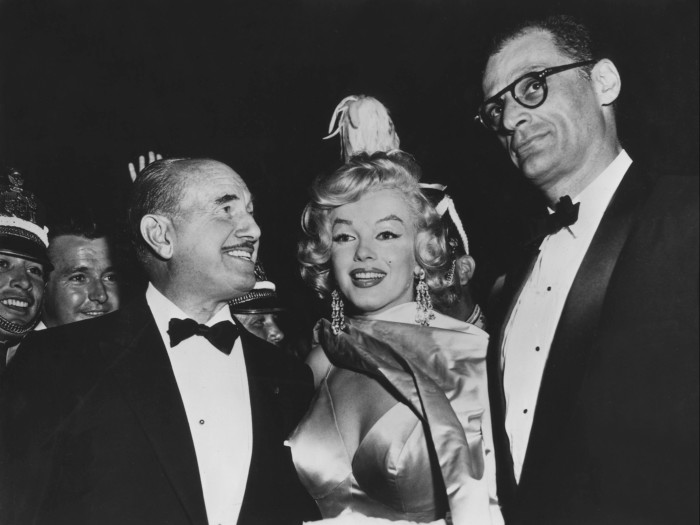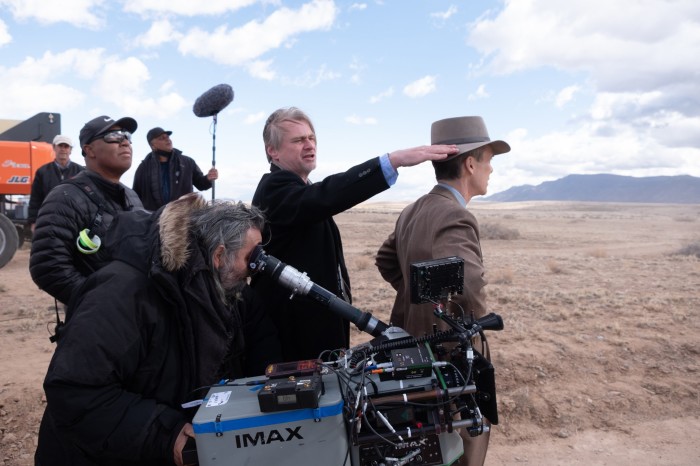Christopher Nolan had clearly had enough. It was December 2020, and the director’s long-term backers Warner Bros had just announced that every film they released in 2021 would appear on their streaming platform HBO Max the same day it did in cinemas. Nolan, a staunch defender of the big screen whose hits for Warners included Inception and The Dark Knight, released a scathing statement. Major filmmakers partnered with “the greatest movie studio”, he said, now found themselves “working for the worst streaming service”.
If that sounded hissy, action followed. Nolan later announced that after two decades making Warner Bros movies, his relationship with the studio was over. And so his next film, Oppenheimer — about the invention of the atomic bomb — will be released this summer by rival Universal.
Warners, meanwhile, is marking its 100th anniversary. Events are planned across multiple “consumer touchpoints”. The most anticipated movie of the year would have made a fine centrepiece. Instead, Nolan’s absence may unnerve staff at the company’s Burbank headquarters: the prodigal son missing from the family gathering.
And the nagging sense of unease around the studio’s future as it begins a second century is striking. Because whatever Hollywood has meant for the past 100 years, Warners is the blue-chip heart of it. The “Tiffany brand” of American film, it has been called: home of Stanley Kubrick and Humphrey Bogart, the money behind Martin Scorsese’s Goodfellas, the Harry Potter films, The Matrix, Bonnie and Clyde, Lord of the Rings and untold more.


The actual date being honoured is April 4 1923, when Jack, Harry, Sam and Albert Warner formally incorporated Warner Bros Pictures. In fact, the brothers were already established producers by then. (A company “Silver Jubilee” was staged in 1930.) But creative licence around age is its own Hollywood tradition.
However old the company was, it was assuredly on the brink of financial disaster when, in October 1927, the Warners gambled on an unproven new technology: sound. The film they made with it, The Jazz Singer, was as disruptive as a meteor strike. The movies were changed forever; the studio instantly launched into the highest strata of Hollywood power. There was a price, however. Sam Warner, champion of sound among the brothers, died the night before the premiere. Leadership of the all-conquering company fell instead to Jack: the youngest sibling, and the only one born a Warner, after the family, originally called Wonsal, emigrated to the US from a Jewish shtetl in Poland.

Who do we mean by Hollywood? Few answers are more compelling than Jack Warner. The American film industry was forever shaped by his particular idea of storytelling, patriotism, economics and, most of all, commitment to the gilded grandeur of Hollywood itself. The Warners of the 1930s and ’40s was talked of as a kingdom, and Jack the autocratic king; his palace a neo-Georgian Beverly Hills mansion larger than that of any other mogul. In 2020, it became the most expensive property in California history. The buyer, at $165mn, was Jeff Bezos.
Yet Warners’ sometimes brilliant films were aimed at the “common man”: gangster movies and noir landmarks, The Maltese Falcon and Casablanca. They were also made with a vigilant eye for dollars and cents, and a stern approach to star talent locked into multiyear contracts. Nolan was not the first big name to butt heads with Warners publicly. In 1943 actress Olivia de Havilland took the studio to court to prevent her contract being unfairly extended. She won: a less famous triumph than The Jazz Singer, but still seismic in Hollywood.

It may have been one of the only times Jack Warner felt disappointed in America. Once the US entered the second world war war, Hollywood legend has it that he took to wearing an army uniform provided by the studio costume department. Later, when postwar America pivoted to anti-communism, he keenly named names, informing on leftwing filmmakers. (By then, he had exerted another, unwitting influence on US politics. Among his contracted players pre-de Havilland was a genial minor male lead called Ronald Reagan.)
Whatever strain of fantasy in American life saw the country finally make a Hollywood actor president, Warner Bros nurtured it. Even Jack Warner’s fiercest critics acknowledged him as a true believer in movies. A Warners film was a tale of ordinary Americans made heroes at large scale. (No surprise that the boss loathed television: HBO Max would have impressed him less than it did Nolan.) The legacy lives on. The studio’s flagship film last year was Elvis, loudly directed by Baz Luhrmann.
By the time the actual Elvis was thrilling audiences, the studio was drifting into soap operas of ownership and control. It still managed to leave a cultural footprint as large as James Dean’s 1955 role in Rebel Without a Cause. But the teenage revolution was an awkward fit for a studio grown pointedly conservative. Warners’ response to the counterculture was best summed up by 1971 strongman cop thriller Dirty Harry, starring Clint Eastwood. He would still be making Warners movies 50 years later.
And there was only ever a partial accommodation with the bright young auteurs of 1970s Hollywood. Steven Spielberg and Francis Ford Coppola set up shop elsewhere, and while George Lucas directed his first film, THX 1138, for the studio in 1971, he was left so vexed by interference that it was his last for them too. Star Wars would be made instead at 20th Century Fox.


Sometimes you take the next cab on the rank. Warner died in September 1978. After so many years mythologising America, his old studio would release Superman three months later; a monster hit whose influence on Warner Bros and movies in general would eventually outstrip even Star Wars. Making films from pre-established intellectual property is now the Hollywood norm. And comic books became the amphetamine of the movie business, not least through Warners’ own superhero tales. The Batman, the studio’s biggest box office hit last year, was just the latest iteration of a long-running franchise.
But the most enduring is still found in the three films made by Nolan between 2005 and 2012 (Batman Begins, The Dark Knight, The Dark Knight Rises), after pitching the studio a vision inspired, he said, by their Superman. That much goes a long way towards explaining the particular sting of his exit: not just a moneymaker, but a living thread back to studio history.

Still, while Warners readies the centenary bunting, the company is now in unsentimental hands. Even by the standards of Hollywood, the current reign of David Zaslav as CEO of parent company Warner Bros Discovery has been dramatic. Multiple series have been pulled from the troubled HBO Max; a completed film (Batgirl) permanently mothballed; Nolan’s exit followed by splits with high-profile director Zack Snyder and heavyweight producers Legendary, makers of Dune. (Though Warners will still release the sequel to that film.) Once unthinkably, speculation has even surrounded the studio’s relationship with Clint Eastwood.
The discord makes a strange soundtrack for a birthday party. But perhaps Zaslav is just paying tribute to the bellicose spirit of Jack Warner. And maybe charting what happens next to Warners is not so different from celebrating a 100th anniversary. Thus far, the CEO’s plans centre on a new Superman, and more spin-offs from Lord of the Rings. The future of the studio, in other words, is in cherry-picking from the past. And like the centenary, the aim is to tell the world there will always be a Warner Bros. At least, for as long as there is a Hollywood.
Find out about our latest stories first — follow @ftweekend on Twitter
Stay connected with us on social media platform for instant update click here to join our Twitter, & Facebook
We are now on Telegram. Click here to join our channel (@TechiUpdate) and stay updated with the latest Technology headlines.
For all the latest Art-Culture News Click Here
